FREE SHIPPING OVER $50
5 Herbal Tea Recipes for Stress Relief and Relaxation
In today’s fast-paced world, it’s easy to get overwhelmed by stress and anxiety. Many people turn to medication or therapy to cope with their feelings, but there are also natural remedies that can help. One such remedy is the use of herbal tea, which has been used for centuries (since ancient China in 2737 BC) to soothe the mind and body. In this article, we will discuss 5 herbal tea recipes and their benefits for stress relief and relaxation.
Chamomile Herbal Tea
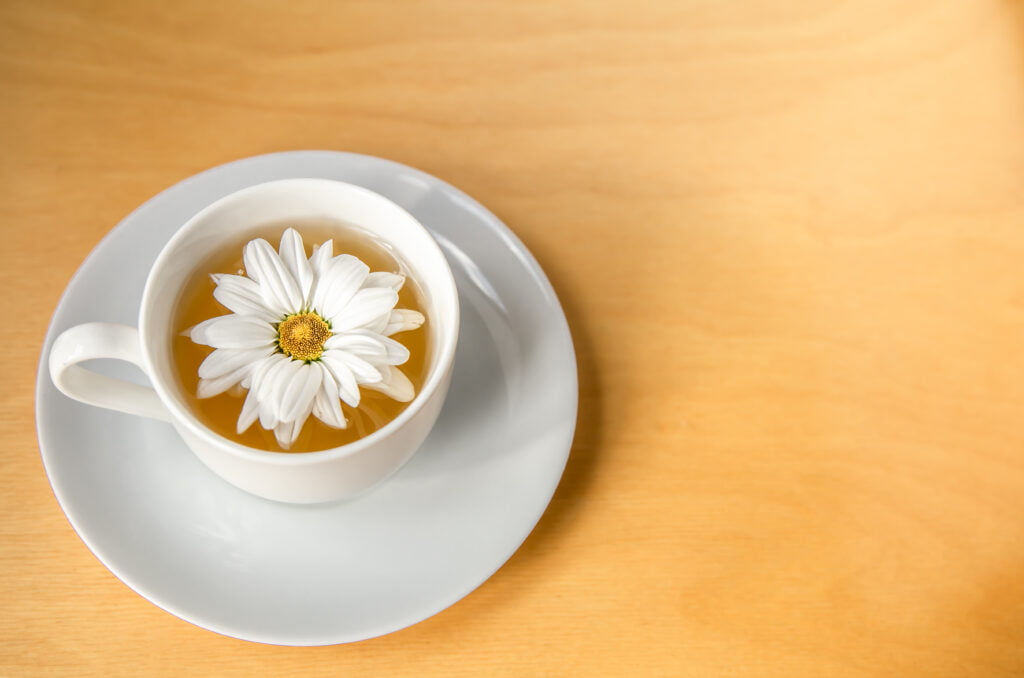
Chamomile tea is a popular herbal tea made from the dried flowers of the chamomile plant. It has been used for centuries as a natural remedy for a variety of ailments and is known for its soothing and calming properties. Chamomile tea is typically caffeine-free and has a light, floral flavor that many people find enjoyable.
Chamomile tea has long been used as a natural remedy for anxiety and stress. It contains compounds like apigenin, which have been shown to have a calming effect on the brain and promote relaxation. Drinking chamomile tea helps reduce feelings of anxiety and promotes better sleep, which can also help to alleviate stress. It also has anti-inflammatory properties and can help to reduce pain and swelling, making it a useful remedy for conditions like arthritis and menstrual cramps.
How to Brew Chamomile Herbal Tea
- Boil water and pour it over a tea bag or a tablespoon of loose chamomile flowers.
- Let the tea steep for 5-10 minutes.
- Finally remove the tea bag or strain the flowers. You can enjoy chamomile tea hot or cold, with or without sweetener, depending on your preference.
Lavender Herbal Tea
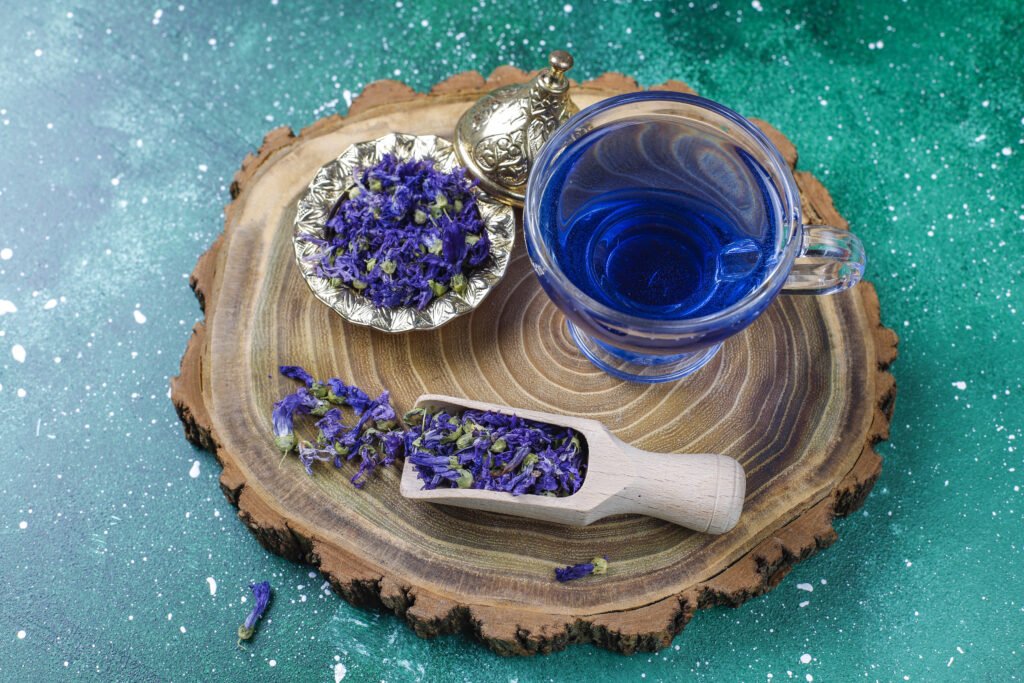
Lavender tea is herbal tea made from the dried buds of the lavender plant. Lavender has a fragrant aroma and is known for its calming properties. It has been used for centuries as a natural remedy for a variety of health conditions.
Lavender tea contains compounds that helps reduce stress and anxiety. The scent of lavender has a soothing effect on the nervous system, which can help promote relaxation and calmness. Drinking lavender tea can also help lower cortisol levels, which is the hormone associated with stress. It also reduces inflammation, improves sleep and promotes digestive health.
How to Brew Lavender herbal tea
- Boil water in a kettle or pot.
- Once the water is boiling, pour it into a teapot or mug that contains 1-2 teaspoons of dried lavender buds.
- Allow the tea to steep for 5-10 minutes, depending on how strong you prefer your tea.
- You can sweeten the tea with honey or sugar if desired. For the best flavor, use high-quality dried lavender buds and avoid overstepping the tea, as this can make it bitter.
Lemon Balm Tea
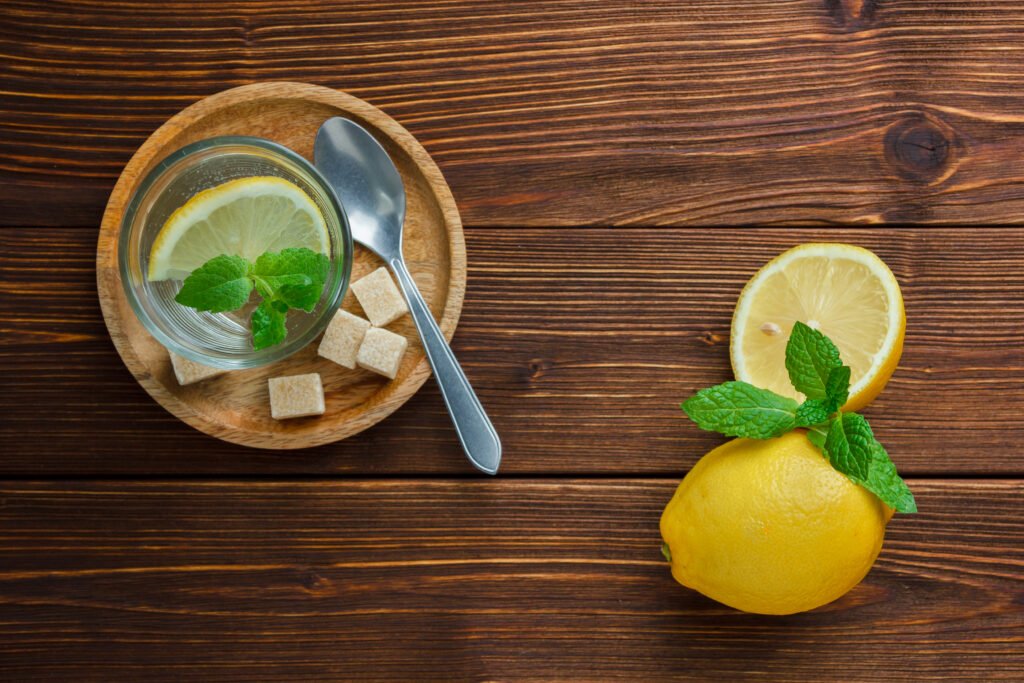
Lemon balm tea is a type of herbal tea made from the leaves of the lemon balm plant. Lemon balm tea has a refreshing, citrusy flavor that is both calming and uplifting.
Lemon balm plant leaves contain compounds that have a calming effect on the body and mind, helping to reduce feelings of tension and promote relaxation. Drinking lemon balm tea can also help to improve mood and improve sleep, making it a great choice for anyone looking for natural stress relief. Studies have also shown that lemon balm tea may have a positive effect on cognitive function, improving memory and concentration.
How to Brew Lemon Balm Tea?
- Steep 1-2 teaspoons of dried lemon balm leaves in boiling water for 5-10 minutes.
- You can also add honey or lemon juice to your tea for added flavor and health benefits. Lemon balm tea can be enjoyed hot or iced, making it a great choice for any time of year.
Valerian Root Tea
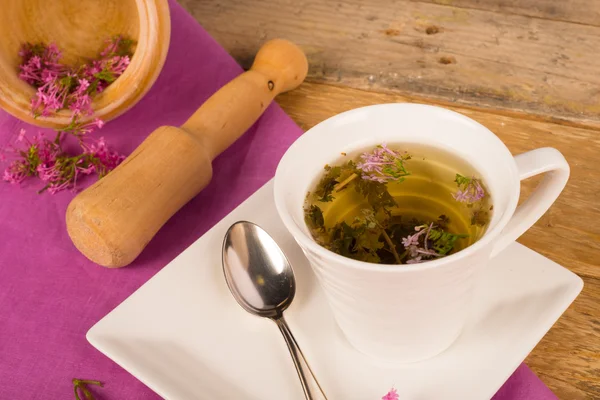
Valerian root tea is a herbal tea made from the root of the valerian plant, which is native to Europe and Asia. Valerian root has been used for centuries as a natural remedy for anxiety, stress, and sleep problems.
Valerian root tea contains compounds that have a calming effect on the nervous system. These compounds are known as valerenic acid and valeranon, interact with the brain’s GABA receptors, which are responsible for regulating anxiety and stress. Valerian root tea may also help to reduce symptoms of menopause, such as hot flashes and night sweats. Additionally, it may have a mild pain-relieving effect, which can help to relieve headaches and other types of pain.
How to Brew Valerian Root Tea
- Boil water in a kettle.
- While the water is heating up, measure out 1-2 teaspoons of dried valerian root and place it in a tea infuser or strainer.
- When the water has boiled, pour it over the valerian root and let it steep for 5-10 minutes, depending on how strong you want the tea to be.
- After steeping, remove the infuser or strainer and discard the valerian root. It’s important to note that valerian root can have a strong smell and taste, so you may want to experiment with different brewing times and amounts to find the right balance for your taste preferences.
Ashwagandha Herbal Tea
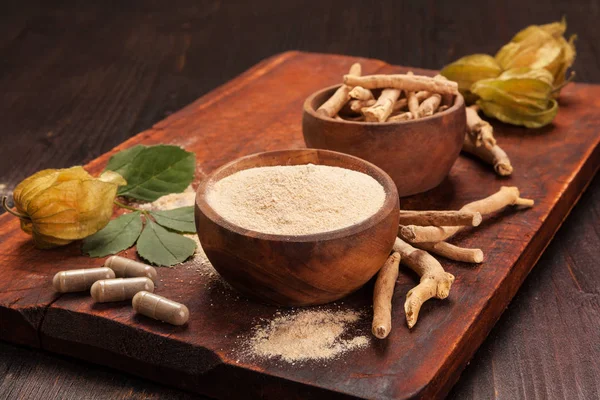
Ashwagandha tea is a herbal tea made from the root of the ashwagandha plant, which is native to India and has been used for thousands of years in traditional Ayurvedic medicine. Ashwagandha is known for its ability to help the body cope with stress, anxiety, and fatigue, and is sometimes referred to as an adaptogen.
Ashwagandha tea contains compounds called withanolides, which have been shown to have a calming effect on the nervous system. These compounds interact with the brain’s GABA receptors, which help to regulate anxiety, stress and promote relaxation.
How to Brew Ashwagandha Herbal Tea
- Boil water in a kettle.
- While the water is heating up, measure out 1-2 teaspoons of dried ashwagandha root and place it in a tea infuser or strainer.
- When the water has boiled, pour it over the ashwagandha root and let it steep for 5-10 minutes, depending on how strong you want the tea to be.
- After steeping, remove the infuser or strainer and discard the ashwagandha root. You can add honey or lemon if you prefer a sweeter taste.
FAQs
Q: Are there any side effects to drinking herbal tea?
A: Generally, herbal tea is considered safe for most people. However, some herbs may cause side effects or interact with medications. If you are pregnant, nursing, or taking medication, it’s best to consult with your healthcare provider before drinking herbal tea.
Q: How long should I steep herbal tea?
A: The ideal steeping time for herbal tea depends on the type of herb and personal preference. As a general rule, steeping for 5-10 minutes is recommended, but some herbs may require a longer steeping time to release their full flavor and benefits.
Q: Can I sweeten herbal tea with sugar or honey?
A: Yes, you can sweeten herbal tea with sugar or honey. However, it’s important to keep in mind that added sugars can contribute to overall sugar intake and may have negative health effects if consumed in excess. Consider using natural sweeteners like honey or stevia in moderation.
Q: Can I drink herbal tea before bed?
A: Yes, drinking herbal tea before bed can promote relaxation and improve sleep quality. However, some herbs like chamomile may have a sedative effect and may make you feel drowsy, so it’s important to avoid operating heavy machinery or driving after drinking tea with these herbs.
Conlusion
Herbal teas are a wonderful way to promote relaxation and reduce stress levels. By incorporating these five delicious herbal tea recipes into your daily routine, you can reap the numerous benefits of their natural ingredients, including improved sleep quality, reduced anxiety, and increased overall wellbeing. So why not give them a try and see how they can help you unwind and de-stress after a long day?
Don’t forget to check out our store and give us a follow on Facebook, Instagram and Pinterest for more health and wellness tips.
Related Articles
- Hibiscus Tea Effect on Kidneys: Benefits and Potential Risks
- Easy Homemade Hibiscus Tea Recipe (Hot and Cold)
- How to Make Elderberry Wine at Home: Step-by-Step Recipe
- Celsius Energy Drinks and Drug Tests: Reasons for False Positives
- Prime Energy Drinks: How Much Caffeine Are You Drinking?
- Heavy Whipping Cream Recipe: Gluten-Free
- Fermented Garlic Honey: Health Benefits and Recipes







